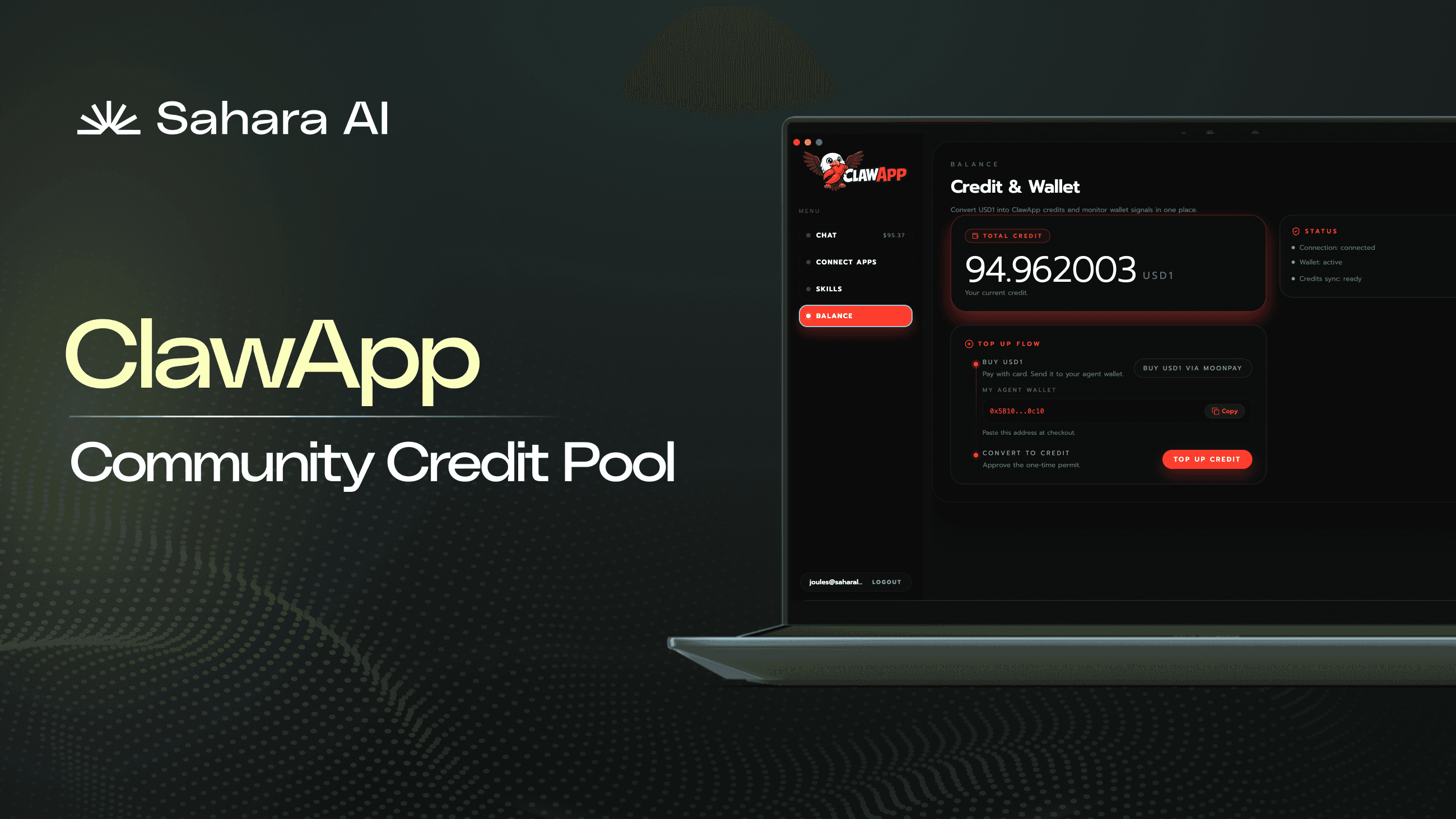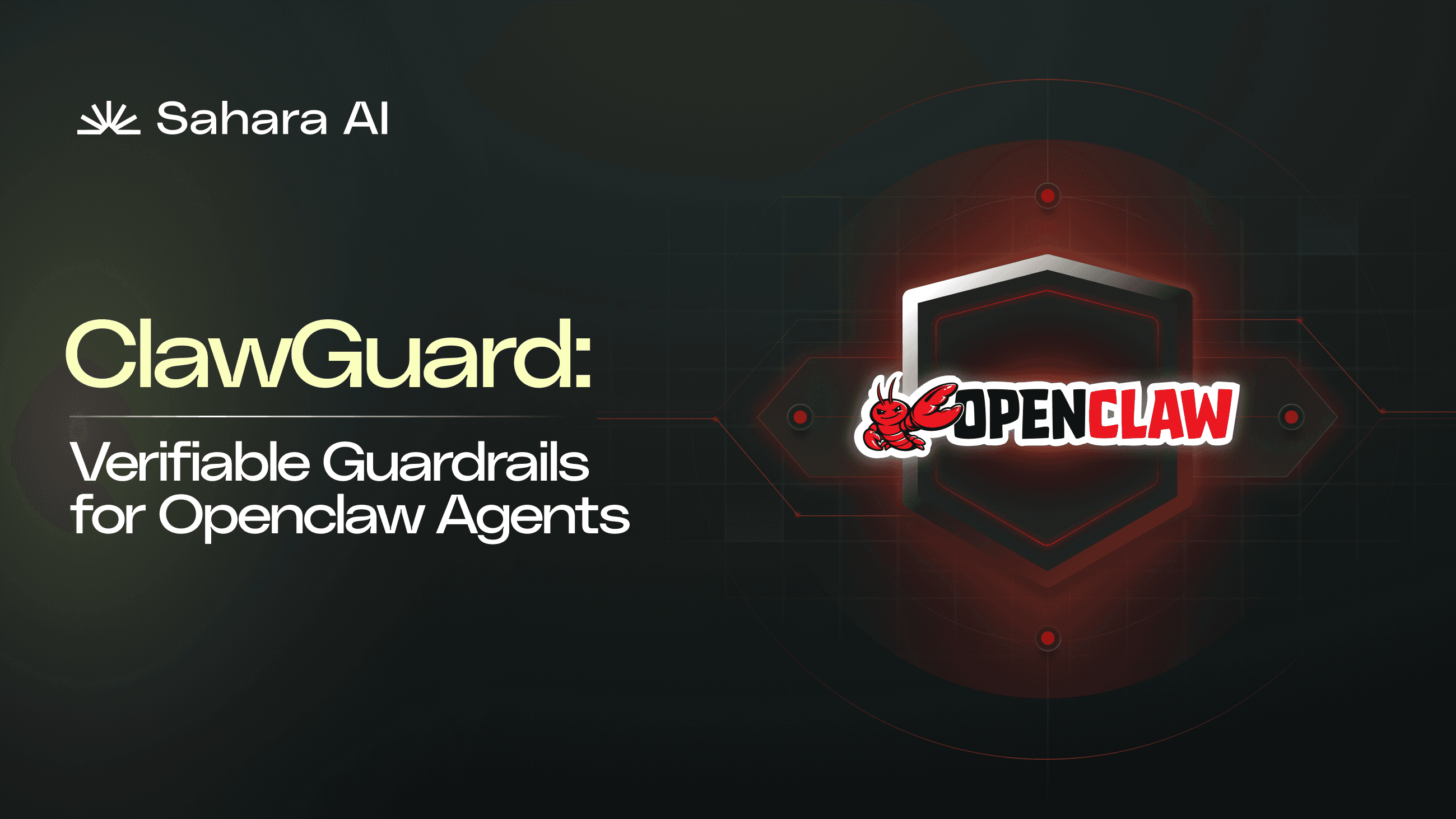AMA | 在人工智能时代,谁拥有创造力?(特色:Camp Network)
2025年8月11日
在这次AMA中,Joules Barragan,我们的营销负责人,探讨了在生成性AI时代知识产权(IP)迅速发展的格局。与来自Camp Network的亚太地区负责人Mike Gin一同加入,我们讨论了AI如何重塑创作所有权。我们深入探讨了创作者在著作权和衍生品方面所面临的挑战,并探索了基于区块链和链上来源的新系统如何保护创作作品,实现公平的货币化,并促进合作创作的新纪元。本次会议清晰地展现了像Camp Network这样的技术如何构建创意权利的未来,并确保创作者能为他们的作品获得报酬。
链接: https://x.com/i/broadcasts/1ynKOMELXEAJR
文本记录
Joules: 好的。我们直播了!大家好,我是Joules,来自Sahara AI,今天的AMA将由我来主持。这个世界正在经历一场IP革命。AI工具让创作、重混和重新构想内容变得比以往任何时候都快和简单。但它们也让著作权、原创性以及在这一新格局中拥有知识产权的意义变得模糊。保护创意和创作作品的旧规则正面临压力,因为新的体系开始出现以填补这些空白。为了帮助我们探索这个问题,我邀请到了来自Camp Network的亚太地区负责人Mike Gin,他也是Sahara数据服务平台的合作伙伴之一。现在,Camp Network正在构建未来的创意IP工具,从用AI生成新作品到在链上铸造它们,甚至让用户注册衍生品。他们还负责我们最新的数据服务平台任务之一,用户可以创建自己的AI生成IP,铸造后与世界分享,同时从Camp Network和Sahara AI获得奖励。所以,Mike,感谢你今天的加入。
Mike: 嗨,大家好,感谢你们让我来到这里。我是Camp Network的亚太地区负责人Mike Gin。如果你们好奇,我的工作基本上是确保这个地区的创作者能够快乐、获得报酬,并且在这个新的AI时代真正拥有他们的创作作品。所以,简单来说,我们希望AI时代的下一幅《蒙娜丽莎》有一个明确的拥有者,即使它正在被重混成1万条TikTok视频和一个重金属专辑封面。
Joules: 是的,这真的很酷。你的工作真的很棒。我希望我们能深入探讨。在我问你所有这些问题之前,你能给我们简要概述一下Camp的使命,以及你如何看待Camp在塑造这一创意IP未来的角色,而不仅仅是《蒙娜丽莎》吗?
Mike: 是的,100%。Camp的核心理念是让创意IP更好地为人类和机器服务。我们为创作者,无论你是独立艺术家、开发者还是大型工作室,提供与AI创作的工具,在链上注册你的作品,并允许他人在你的许可和保留版权的情况下建立衍生作品。AI时代最大变化是速度和规模。在AI出现之前,如果你创作了某个原创作品,可能要几个月后才会有人复制或在其基础上创作。现在你可以在早上发布一个设计,到午饭时,网络上就会出现50个AI生成的衍生作品—有些是恭维, 有些则不那么恭维。这完全颠覆了所有权的挑战。问题不再是人们会否重混你的作品;而是要有一套系统,第一,你可以证明你的所有者来源在Camp的模块上;第二,你可以设定规则,让别人如何在此基础上进行创作。我认为传统的版权无法赶上这么快。这就像要求邮政局来管理电子邮件。我们需要适合AI创作的新体系。区块链和智能合约为我们提供了可编程的权利层。它并不会在一夜之间取代版权,但是这是第一个真正的全球、始终在线的IP注册。
Joules: 太好了,谢谢你。显然,我在Sahara AI工作,所以我对知识产权和这些问题充满热情。我认为生成性AI完全重塑了当今时代人们的创造方式。无论是数字艺术、谱写音乐还是编码都如此。生成性AI不会消失。而且创作的原创性与衍生品之间的界线比AI之前变得更加模糊。我认为与其与这种转变抗争,问题在于我们如何建立保护创作者的系统,鼓励合作,允许创造力在这一新现实中繁荣发展?因为AI可以在几秒钟内生成内容,无论是艺术、故事、歌曲,你说的都可以。而这种新创作通常是基于已经存在的大量工作进行训练的AI生成的。我好奇,Mike,从你的角度来看,AI改变创作者声称所有权和证明著作权的最重要方式是什么?
Mike: 事情是这样的:重混是互联网的母语。表情包、TikTok的声音、粉丝艺术—这一切都是重混。所以AI只是把音量调到了11。如果我们没有一种方式来注册和预测衍生作品,我们最终会陷入两个极端。第一个是混乱,每个人都不知道是谁创作了什么,创作者放弃了。第二个是封锁,每个人都害怕重混,创意也就没有了。我们认为中间的解决方案就是注册重混。你可以在别人的作品上构建,但原始创作者获得可见性和可能的版税。想象一下,这就像爵士乐。你在别人主题的基础上即兴演奏,但房间里的每个人都知道这首歌最初是从哪里开始的。是的,我刚把区块链比作了爵士乐,所以请不要引用我。我们已经找到了一个方法,通过区块链,所有东西都是透明的并带有时间戳, 所以这是一个非常好的存储任何人作品的方式。而且对于创作者来说,我们还拉起了AI工具。当有人进行重混时,我们知道是谁进行了重混。这就是我们的基本愿景。
Joules: 你能快速解释一下重混对于并不熟悉的人是什么意思吗?
Mike: 重混简而言之就是第二次创作。当其他人有一些工作时,例如,我拥有一个非常可爱的Labubu。当然,版权来自Pop Mart,但我想在其上进行第二次创作。所以我画了一些这个肖像的图片。也许给他戴个帽子或者用它做一个动画。这就是重混。
Joules: 酷,谢谢你。我想要追溯一下你之前说的关于我们需要新的知识产权体系,而且我们并不会在一夜之间取代当前的知识产权体系。你认为我们朝着一个专为AI时代设计的全新知识产权体系迈进吗?还是你认为现有的版权法现实地可以发展以保护人类和AI辅助的创作?
Mike: 是的,我认为体系的演变是不可避免的。现在一切都非常缓慢。在Web2时代,注册一个版权可能需要几个月甚至几年。但随着区块链,一切都可以在几次点击中完成。来源不只是炫耀权,而是权力。现在,云平台通常控制观众和收入。通过区块链,已经证明创作者可以完全绕过平台,直接与粉丝连接,并证明他们是最早制作的,即使AI克隆充斥网络。这就像在你的作品上有一个时间戳,防篡改的签名,表明“是的,这是我制作的。是的,你可以在此基础上进行创作。不,你不能假装你是最早制作的。”所以这改变了从平台制定规则到创作者设定规则的平衡。以Spotify为例,99%的创作者实际上都是在花钱制作音乐,因为大部分收入都被Spotify拿走了。所以Camp直接连接到创作者、重混者和商业拥有者。这就是我认为知识产权演变是不可避免的原因。
Joules: 是的,这是一个非常合理的观点。我们谈了很多重混和衍生IP。重混并不是新鲜事,对吧?但如今,AI可以在几秒钟内生成同一概念的无限变化或衍生品。为什么以正式的方式注册和归属衍生作品是重要的?
Mike: 是的,这是一个非常好的问题。目前AI不必成为艺术家的威胁;它可以成为一种新的权力来源。虽然今天的大多数AI在没有权限的情况下训练创意工作和作品,但Camp翻转了这种局面。我们给其他人工具来许可他们的知识产权给AI代理并从中获利。所以,与其担心AI,创作者们现在可以从中获利。Camp使创作者能够在链上注册他们的知识产权,并设定使用条款,包括AI系统。通过可编程的许可,AI艺术家保留控制权,并在每次他们的工作贡献给AI训练或输出时获得报酬。想象一下,这就像在AI时代的版税系统。你的创意DNA,按照你的条款。
Joules: 是的,我认为这有道理。这真的很有趣。作为一个社会,我认为在创造责任重混的框架与我们是否应该试图限制相比,有很多讨论,因为“AI坏”或“AI好”。我想知道从你的角度来看,你如何确保这些框架对原始创作者和其上方构建的人都是公平的?
Mike: 是的,让我们深入探讨。传统的许可结构限制了知识产权的追踪、归属和创作的重用。Camp引入了来源和矩阵框架,在其中,知识产权可以被铸造、拥有、重混和货币化,所有的过程都是透明和可验证的。它通过使用AI和区块链与知识产权创造了一种新的共同创作货币化模型。首先,来源是用户引导和知识产权代币化层。来源SDK让开发者和用户将他们的作品代币化为IP非同质化代币(NFT)。其次,这些IP NFT可以自动流入矩阵,Camp的AI框架。因此,矩阵基本上是训练在用户拥有的知识产权上的AI代理框架。这是一个模块化的代理系统,训练在Camp注册的知识产权上,实现智能重混、共同创作和差异化内容生成,始终嵌入归属和货币化。来源和矩阵共同构成了IP和AI之间可扩展共同创作的基础设施。在这个系统中,粉丝可以创造、重混和合作,而原始创作者会实时获得版税和分配。参与的每个人都可以获得自己的利润。因此,在Camp,衍生品和源知识产权一样重要。
Joules: 我刚刚在静音,很抱歉。这是Camp Network的一个非常好的概述。谢谢你,Mike。我很好奇。这一切都在链上,这很棒。我热爱AI与区块链的交集。我们所存在的这个地方对我来说太神奇了,绝对是未来。我确信我曾经在Web3待了很久,然后我对AI非常热衷。所以现在我能够将这两者结合起来,我非常兴奋。通过所有你刚刚提到的区块链,除了证明谁是第一个制作的,透明性如何、区块链所赋予的透明来源,如何改变创作者、平台和观众之间的权力平衡?尤其是当AI衍生作品可以在互联网上淹没类似作品时?
Mike: 是的,当然。因此,现在大多数AI都是在公开的互联网数据上训练的,这意味着它通常会生成重复的内容。Camp改变了这一点。通过矩阵框架,任何人都可以启动一个AI代理,并在用户拥有的知识产权上进行训练,例如我们的NFT系列Remix Trailheads。因此,它创造了原创、个性化且完全在链上的内容。这可以解锁可扩展的合作创作。使用Camp的工具,你可以在几分钟内创建自己的AI代理,并使用你创建或重混的链上知识产权进行训练。AI将生成具有内置归属和所有权跟踪的独特输出。然后,使用来源,你可以对新的知识产权进行代币化,赋予其现实世界的价值,启用未来的版税和共同创作,所有这些都在链上透明地进行。如果你是用户,你是版权的拥有者,你可以决定你希望如何分配它,谁想获得许可,所有的一切都取决于拥有者本身。我们使用TE和zk证明确保这些作品的隐私。如果所有者说是的,那就是是的。如果所有者说不,那就是不。
Joules: 这真的很酷。现在我们是合作伙伴,我们有我们的数据服务平台任务在一起。我很好奇。通过数据服务平台,我们邀请人们使用Camp的重混平台来创建AI生成的知识产权,铸造它,分享它,然后他们会获得奖励。你或你的团队从真实用户创建和注册他们的作品中学到了什么?这是否帮助验证或演变了你的平台?
Mike: 是的,与Sahara DSP的合作非常棒,因为这就像在观看我们平台的实时压力测试。我们看到了从华丽的原创艺术到滑稽的混搭,比如有人把可爱的小吉祥物变成了一个赛博朋克武士。我们学到的是,当人们知道重混是安全和公平的时,他们想进行重混。而拥有可见的链上记录也使他们更有可能信用原作者,这帮助我们完善了用户体验。因此,注册作品感觉就像在社交媒体上发布一样简单,但保护却好得多。另一个高层的哲学问题是我总是想问的一个问题,我年轻的时候就是“人类情感可以编程吗?”当我们听到好音乐,看到泰勒·斯威夫特的面孔时,我们感到快乐。我认为我们的基因和大脑中有一些东西是被编程去喜欢的。因此,我们希望找到这些让我们喜欢的特征。例如,Labubu是相当可爱的,泰勒·斯威夫特的整个歌曲非常受欢迎。为什么它受欢迎,不仅仅是因为是泰勒·斯威夫特,还有旋律、泰勒·斯威夫特是如何制作它的,以及艺术家是如何绘制Labubu的,令人惊叹的毛发、兔耳。所有这些复杂的组合让我们被编程去喜欢它们。因此,通过Sahara的DSP,我们希望探索这些特征、这些流行度和人类关注的组合。
Joules: 太棒了。你在这个直播中提到Labubu好几次了。那么最后一个问题,我要问你,Mike。你拥有一只Labubu吗?
Mike: 是的,我实际上拥有很多。我们为赠品买了很多Labubu。它们太好了。
Joules: 太棒了。太酷了。我有几个。运气不错。有人送给我,我完全,遗憾的是,迷恋上了它们。
Mike: 所以是的,我认为我们被编程去迷恋它们。
Joules: 是的,我知道。我让我的一个朋友把它们全都带到她的工作中。她带着七个Labubu的包走进办公室,她说大家都在谈论她。
Mike: 是的,太疯狂了。
Joules: 我们确实。我想确保我们有时间给观众提问。所以我们已经收到了不少观众的问题。如果你有更多问题,请在这个阶段的评论中留给我,我会在这个直播中处理它们。所以让我看看。我们有的第一个问题,Mike,是“到目前为止,你在平台上看到的最具创意或意想不到的知识产权是什么?”
Mike: 是的,这是个很好的问题。一位用户制作了一条重混链,层次深达12层。它开始时是一张猫的照片,最终变成了一张科幻战斗海报,里面完全没有猫。那真是不可思议。
Joules: 那真不错。让我看看。“当两部作品非常相似或共享相同源材料时,你们如何处理争议或重叠的索赔?”
Mike: 首先,我们的系统展示创作时间戳。如果两部作品可疑地相似,时间线就会说话。我们还有一个社区审查和处理边缘案件的流程。此外,我们还有争议系统。如果知识产权的拥有者发现他们的作品被盗,他们可以前往我们的平台声明他们的原创性。因此,一旦线下证明了原创性,他们的作品将被存储在链上,并立即获得版税。
Joules: 太棒了。让我看看。“这种注册重混的模型是否可以超越图像,应用于音乐、视频或写作?”
Mike: 绝对可以。因为图像是易于维护和分享的,所以它们只是一个开始。这一框架适用于任何数字资产。
Joules: 是的,我喜欢这个。我感觉很多AI公司现在都专注于一个。我看到很多都是专门关注写作或代码或图像。慢慢地,每个人都开始逐渐推出并扩大所有内容。一旦找到自己的利基,看到景观是多么的演变,真的很酷。
Mike: 是的,一切都是知识产权。
Joules: 是的,一切都是知识产权。确实如此。我认为这一周期有趣的事情是在叙述中,之前的叙述总是围绕数据和拥有你的数据。显然,在Sahara,我们仍然非常支持你的数据,你的AI数据,知识产权,它们都是同样的事情,只是不同的词来描述它。因此,看到叙述走向和人们关注的不同点真的很有趣。谈到知识产权,这里有个问题。“你认为知识产权铸造将成为未来所有AI生成创作的标准实践吗?”
Mike: 是的,我认为是的。就像今天的大多数照片都有元数据一样,大多数AI生成的作品最终都会有链上的来源印记。
Joules: 是的,我完全同意这一点100%。我认为在我们没有时间之前还有几个问题。“你会给希望在快速发展的AI时代保护自己创作的创作者什么建议?”
Mike: 现在就开始在Camp上建立你的知识产权足迹,即使只是为了好玩。你将会感谢自己。
Joules: 使用Camp有多简单?
Mike: 是的,它非常友好。所有的东西都被抽象化。你无需下载MetaMask或拥有一个交易所钱包。你可以用Web2的电子邮件进行注册,另外在我们的铸造页面上也相当简单。你只需上传,就像在OpenSea上铸造NFT一样,上传一张图像,输入一些描述,然后铸造。
Joules: 好吧,然后还有另一个问题。“如果我将我的作品上传至Camp,我需要让它能够进行重混吗?”
Mike: 目前,我认为这还是一个逐步的过程。它仍在开发中,但我们的主网将很快上线。透明性是关键模型,因此作品是可追溯的。早期解决问题更容易。随后,TE模块和ZK模块也将嵌入。然后用户可以自定义如何追踪他们的作品。好吧,酷。
Joules: 然后我看到其他问题大多数都是我们已经回答过的问题。还有一些人说:“嗨,Mike。”好的,就这些。我再次感谢你,Mike。感谢你参与。感谢Camp Network加入我们。感谢所有今天收看的人,如果你还没有,请务必查看Camp Network在我们的Sahara数据服务平台的重混IP创造挑战。你可以在我们的X页面找到链接。你所要做的就是创建自己的AI生成IP,在链上铸造,然后在X上分享。确保标记你需要标记的内容。所有的规则都将在数据服务平台上发布。你将获得Camp代币,获得Sahara代币。还有一些我们与Camp Network进行的其他数据服务平台项目,我还不能透露。但本周即将有公告发布,所以一定要保持关注。不过,Mike,在我们走之前,你还有什么想说的吗?
Mike: 是的。谢谢你,Joules。感谢所有加入的人。如果你还没尝试在Sahara DSP上进行Camp重混IP创造挑战,创造一些疯狂的东西,铸造它,或者在区块链历史书上留下你的名字,或者至少在重混排行榜上留下你的名字。在Camp,我们相信创意IP的未来不是人类对抗AI,而是人类与AI共同构建,但需要清晰的规则和公平的报酬。所以今天去创造一些东西,确保你明天真的拥有它。
Joules: 太棒了。谢谢你,Mike。感谢大家。祝你们每天都过得愉快。
Mike: 谢谢大家。祝你们每天都过得愉快。




